BPC311 Event Management Report: World Master Games Strategic Plan
VerifiedAdded on 2023/06/03
|11
|2966
|211
Report
AI Summary
This report, prepared for a strategic planning committee, analyzes the 2021 World Master Games to be held in Kansai, Japan, focusing on the event management process. The report begins with an introduction to the International Master Games Association (IMGA) and a case study of the 2017 Auckland games. It then details the various stages of event management, including initiation, planning, implementation, the event itself, and closure, emphasizing the importance of marketing at each stage to ensure a positive customer experience. Furthermore, the report rationalizes the application of marketing principles, such as marketing domains, design, marketing, operations, and risk management, to meet stakeholder expectations, including the use of the 5Ps of marketing: product, price, place, promotion, and people. The report provides a comprehensive overview of the strategic planning process for the event, focusing on marketing and consumer experience.
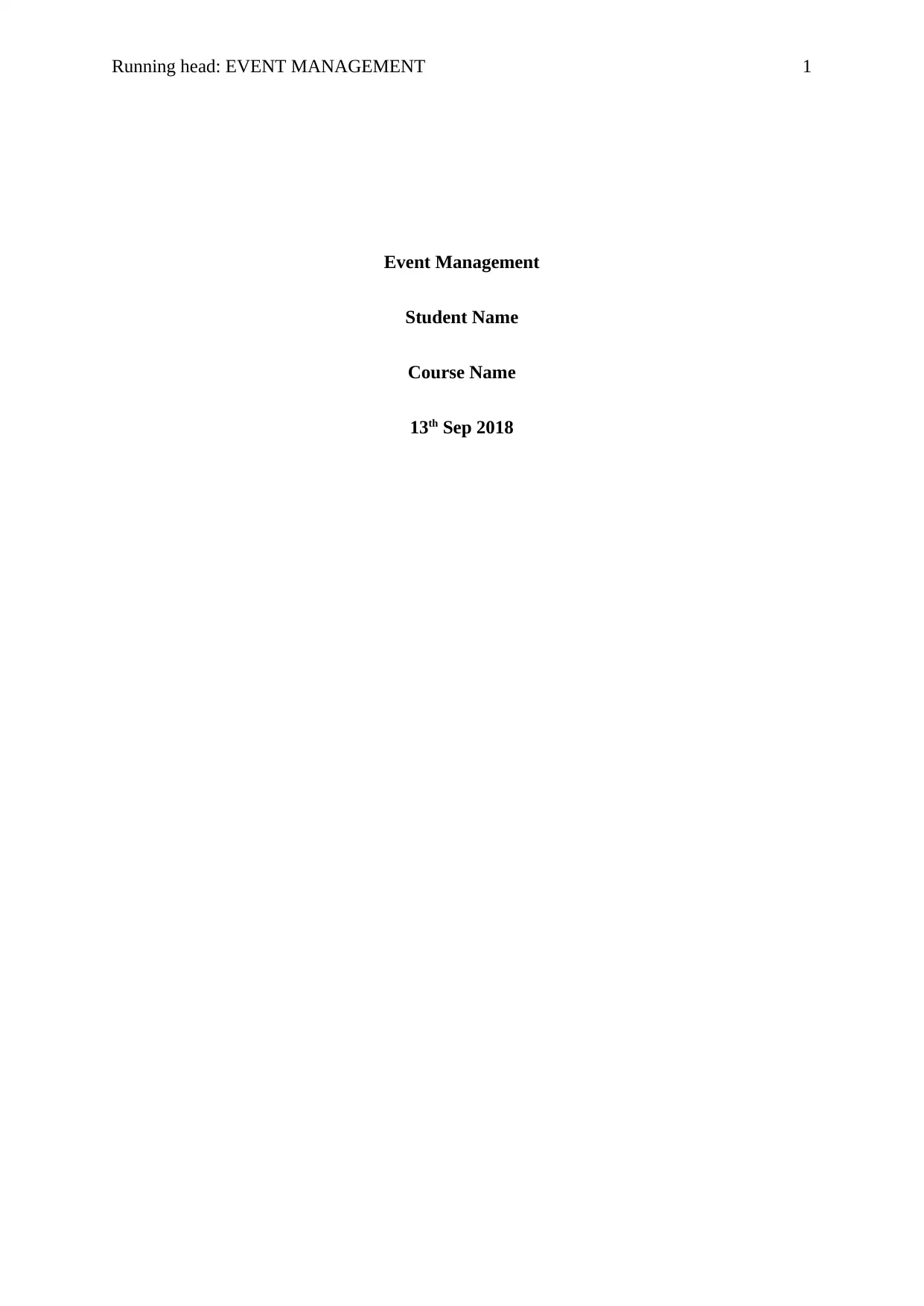
Running head: EVENT MANAGEMENT 1
Event Management
Student Name
Course Name
13th Sep 2018
Event Management
Student Name
Course Name
13th Sep 2018
Paraphrase This Document
Need a fresh take? Get an instant paraphrase of this document with our AI Paraphraser
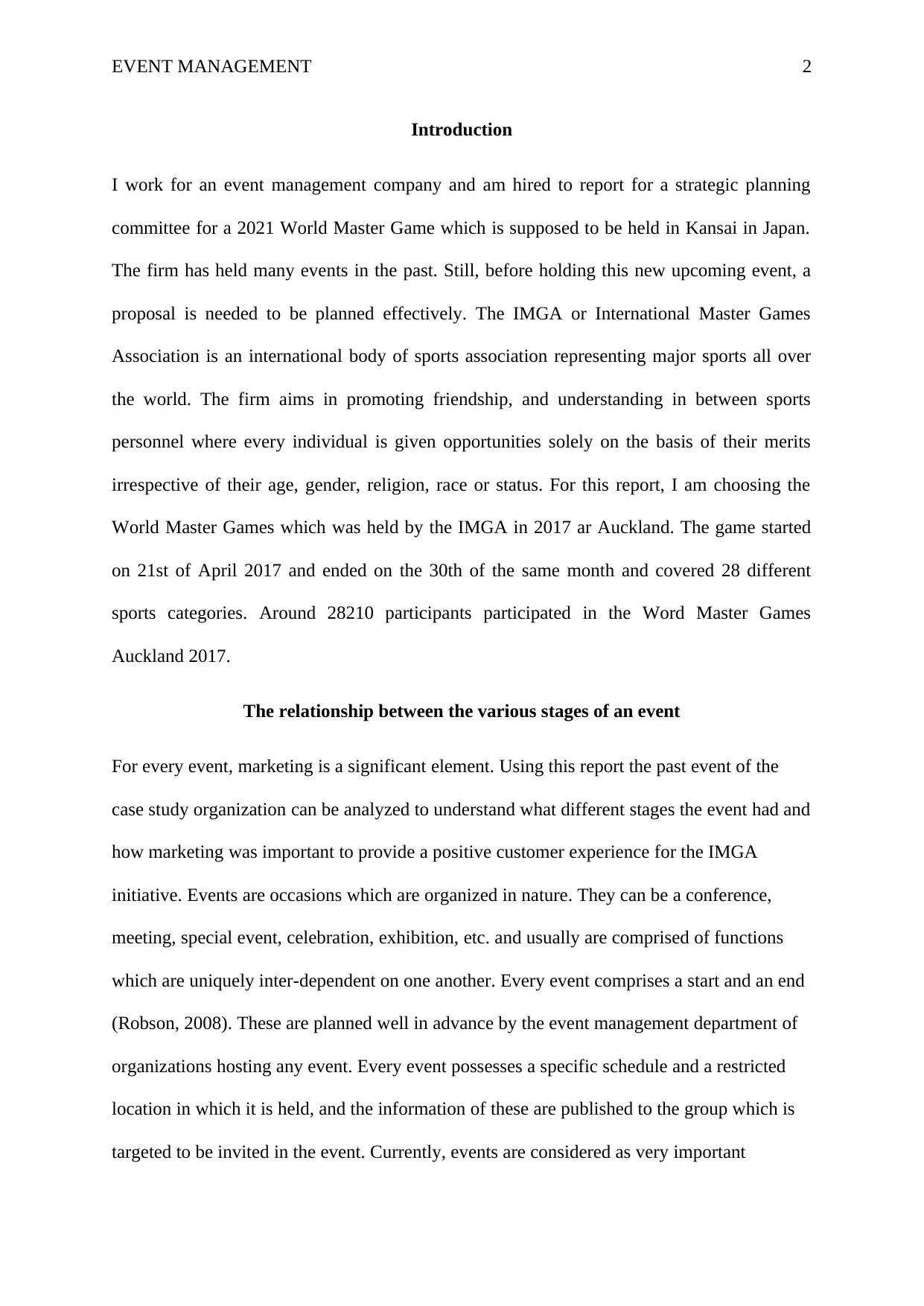
EVENT MANAGEMENT 2
Introduction
I work for an event management company and am hired to report for a strategic planning
committee for a 2021 World Master Game which is supposed to be held in Kansai in Japan.
The firm has held many events in the past. Still, before holding this new upcoming event, a
proposal is needed to be planned effectively. The IMGA or International Master Games
Association is an international body of sports association representing major sports all over
the world. The firm aims in promoting friendship, and understanding in between sports
personnel where every individual is given opportunities solely on the basis of their merits
irrespective of their age, gender, religion, race or status. For this report, I am choosing the
World Master Games which was held by the IMGA in 2017 ar Auckland. The game started
on 21st of April 2017 and ended on the 30th of the same month and covered 28 different
sports categories. Around 28210 participants participated in the Word Master Games
Auckland 2017.
The relationship between the various stages of an event
For every event, marketing is a significant element. Using this report the past event of the
case study organization can be analyzed to understand what different stages the event had and
how marketing was important to provide a positive customer experience for the IMGA
initiative. Events are occasions which are organized in nature. They can be a conference,
meeting, special event, celebration, exhibition, etc. and usually are comprised of functions
which are uniquely inter-dependent on one another. Every event comprises a start and an end
(Robson, 2008). These are planned well in advance by the event management department of
organizations hosting any event. Every event possesses a specific schedule and a restricted
location in which it is held, and the information of these are published to the group which is
targeted to be invited in the event. Currently, events are considered as very important
Introduction
I work for an event management company and am hired to report for a strategic planning
committee for a 2021 World Master Game which is supposed to be held in Kansai in Japan.
The firm has held many events in the past. Still, before holding this new upcoming event, a
proposal is needed to be planned effectively. The IMGA or International Master Games
Association is an international body of sports association representing major sports all over
the world. The firm aims in promoting friendship, and understanding in between sports
personnel where every individual is given opportunities solely on the basis of their merits
irrespective of their age, gender, religion, race or status. For this report, I am choosing the
World Master Games which was held by the IMGA in 2017 ar Auckland. The game started
on 21st of April 2017 and ended on the 30th of the same month and covered 28 different
sports categories. Around 28210 participants participated in the Word Master Games
Auckland 2017.
The relationship between the various stages of an event
For every event, marketing is a significant element. Using this report the past event of the
case study organization can be analyzed to understand what different stages the event had and
how marketing was important to provide a positive customer experience for the IMGA
initiative. Events are occasions which are organized in nature. They can be a conference,
meeting, special event, celebration, exhibition, etc. and usually are comprised of functions
which are uniquely inter-dependent on one another. Every event comprises a start and an end
(Robson, 2008). These are planned well in advance by the event management department of
organizations hosting any event. Every event possesses a specific schedule and a restricted
location in which it is held, and the information of these are published to the group which is
targeted to be invited in the event. Currently, events are considered as very important
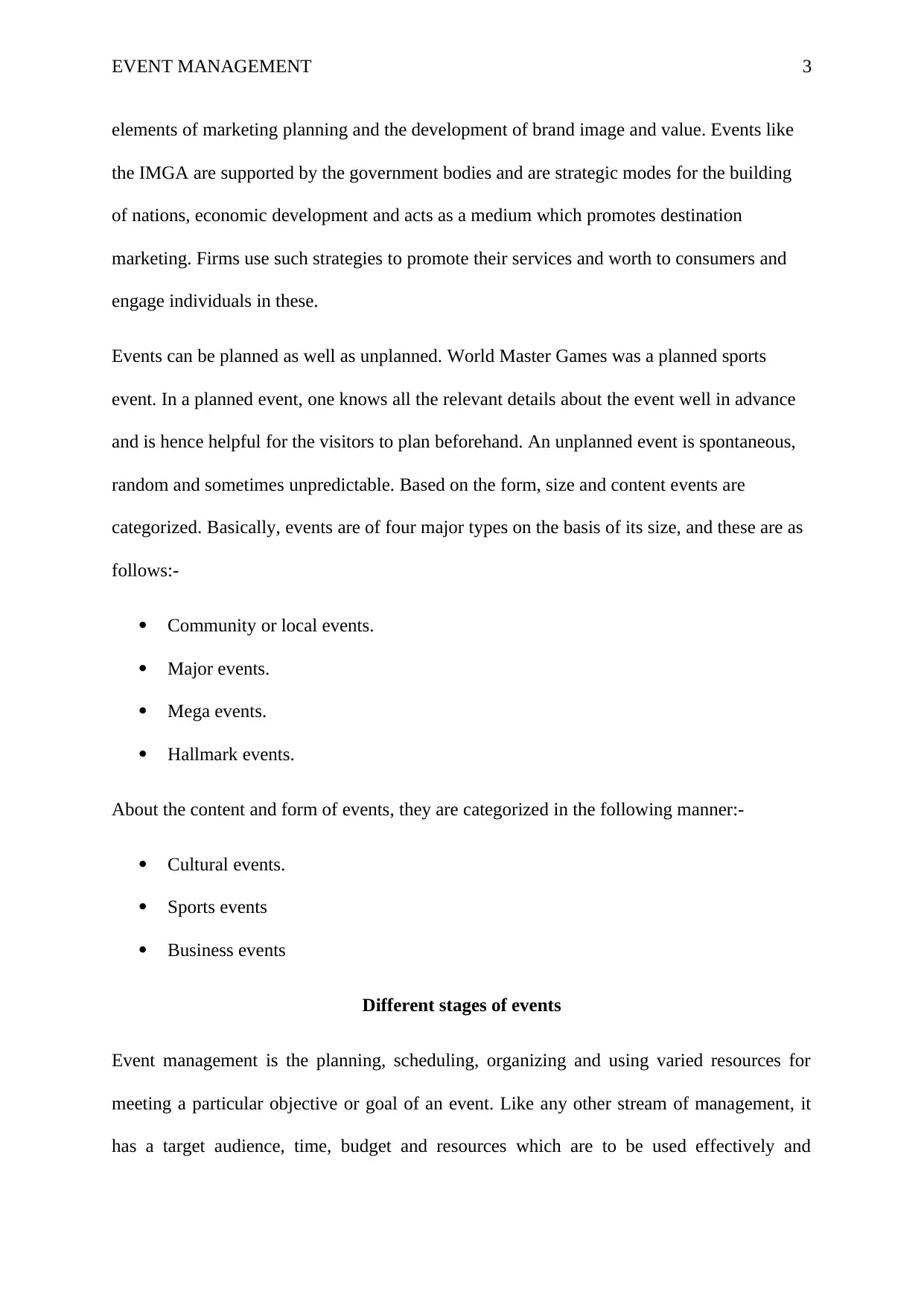
EVENT MANAGEMENT 3
elements of marketing planning and the development of brand image and value. Events like
the IMGA are supported by the government bodies and are strategic modes for the building
of nations, economic development and acts as a medium which promotes destination
marketing. Firms use such strategies to promote their services and worth to consumers and
engage individuals in these.
Events can be planned as well as unplanned. World Master Games was a planned sports
event. In a planned event, one knows all the relevant details about the event well in advance
and is hence helpful for the visitors to plan beforehand. An unplanned event is spontaneous,
random and sometimes unpredictable. Based on the form, size and content events are
categorized. Basically, events are of four major types on the basis of its size, and these are as
follows:-
Community or local events.
Major events.
Mega events.
Hallmark events.
About the content and form of events, they are categorized in the following manner:-
Cultural events.
Sports events
Business events
Different stages of events
Event management is the planning, scheduling, organizing and using varied resources for
meeting a particular objective or goal of an event. Like any other stream of management, it
has a target audience, time, budget and resources which are to be used effectively and
elements of marketing planning and the development of brand image and value. Events like
the IMGA are supported by the government bodies and are strategic modes for the building
of nations, economic development and acts as a medium which promotes destination
marketing. Firms use such strategies to promote their services and worth to consumers and
engage individuals in these.
Events can be planned as well as unplanned. World Master Games was a planned sports
event. In a planned event, one knows all the relevant details about the event well in advance
and is hence helpful for the visitors to plan beforehand. An unplanned event is spontaneous,
random and sometimes unpredictable. Based on the form, size and content events are
categorized. Basically, events are of four major types on the basis of its size, and these are as
follows:-
Community or local events.
Major events.
Mega events.
Hallmark events.
About the content and form of events, they are categorized in the following manner:-
Cultural events.
Sports events
Business events
Different stages of events
Event management is the planning, scheduling, organizing and using varied resources for
meeting a particular objective or goal of an event. Like any other stream of management, it
has a target audience, time, budget and resources which are to be used effectively and
⊘ This is a preview!⊘
Do you want full access?
Subscribe today to unlock all pages.

Trusted by 1+ million students worldwide
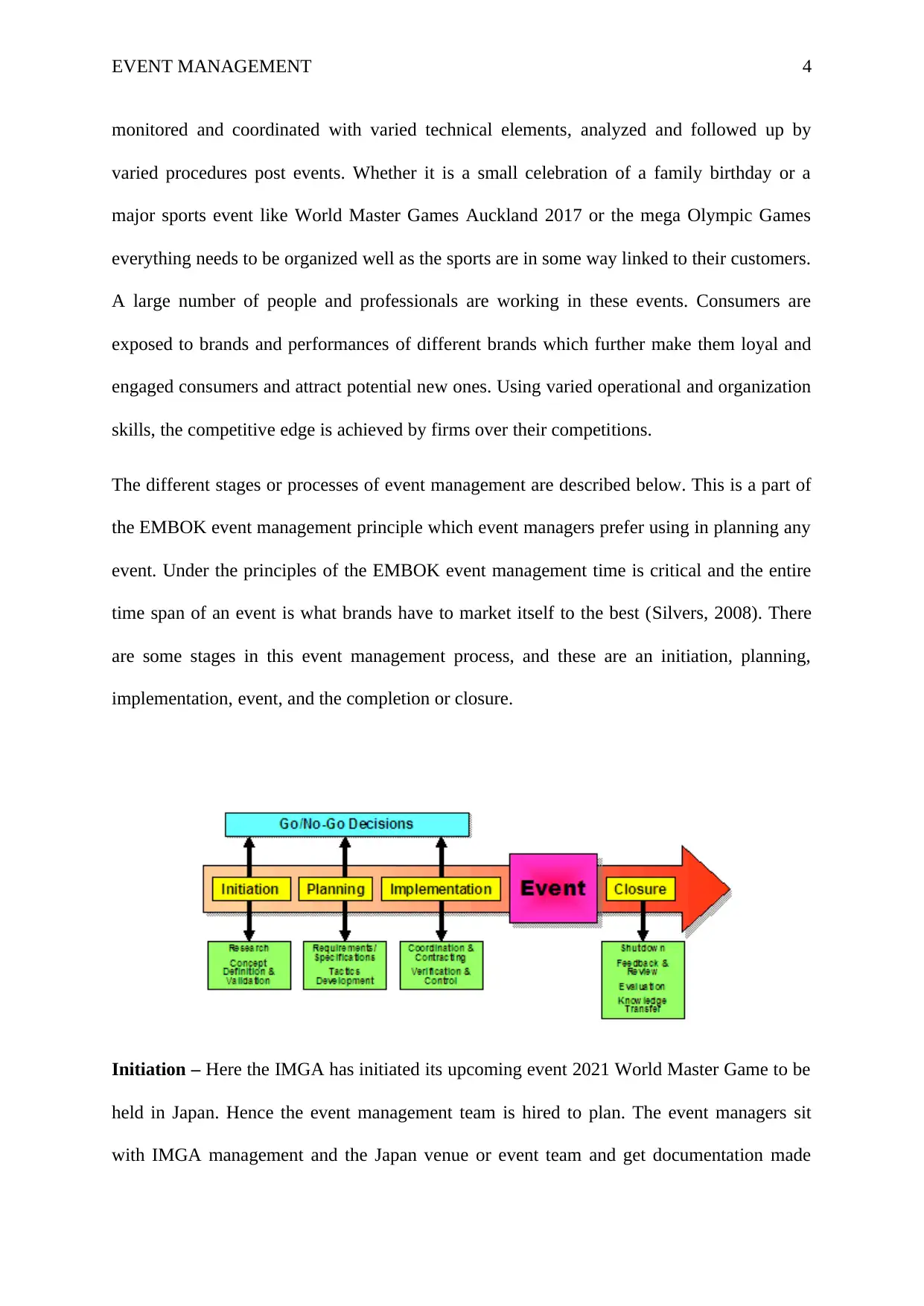
EVENT MANAGEMENT 4
monitored and coordinated with varied technical elements, analyzed and followed up by
varied procedures post events. Whether it is a small celebration of a family birthday or a
major sports event like World Master Games Auckland 2017 or the mega Olympic Games
everything needs to be organized well as the sports are in some way linked to their customers.
A large number of people and professionals are working in these events. Consumers are
exposed to brands and performances of different brands which further make them loyal and
engaged consumers and attract potential new ones. Using varied operational and organization
skills, the competitive edge is achieved by firms over their competitions.
The different stages or processes of event management are described below. This is a part of
the EMBOK event management principle which event managers prefer using in planning any
event. Under the principles of the EMBOK event management time is critical and the entire
time span of an event is what brands have to market itself to the best (Silvers, 2008). There
are some stages in this event management process, and these are an initiation, planning,
implementation, event, and the completion or closure.
Initiation – Here the IMGA has initiated its upcoming event 2021 World Master Game to be
held in Japan. Hence the event management team is hired to plan. The event managers sit
with IMGA management and the Japan venue or event team and get documentation made
monitored and coordinated with varied technical elements, analyzed and followed up by
varied procedures post events. Whether it is a small celebration of a family birthday or a
major sports event like World Master Games Auckland 2017 or the mega Olympic Games
everything needs to be organized well as the sports are in some way linked to their customers.
A large number of people and professionals are working in these events. Consumers are
exposed to brands and performances of different brands which further make them loyal and
engaged consumers and attract potential new ones. Using varied operational and organization
skills, the competitive edge is achieved by firms over their competitions.
The different stages or processes of event management are described below. This is a part of
the EMBOK event management principle which event managers prefer using in planning any
event. Under the principles of the EMBOK event management time is critical and the entire
time span of an event is what brands have to market itself to the best (Silvers, 2008). There
are some stages in this event management process, and these are an initiation, planning,
implementation, event, and the completion or closure.
Initiation – Here the IMGA has initiated its upcoming event 2021 World Master Game to be
held in Japan. Hence the event management team is hired to plan. The event managers sit
with IMGA management and the Japan venue or event team and get documentation made
Paraphrase This Document
Need a fresh take? Get an instant paraphrase of this document with our AI Paraphraser
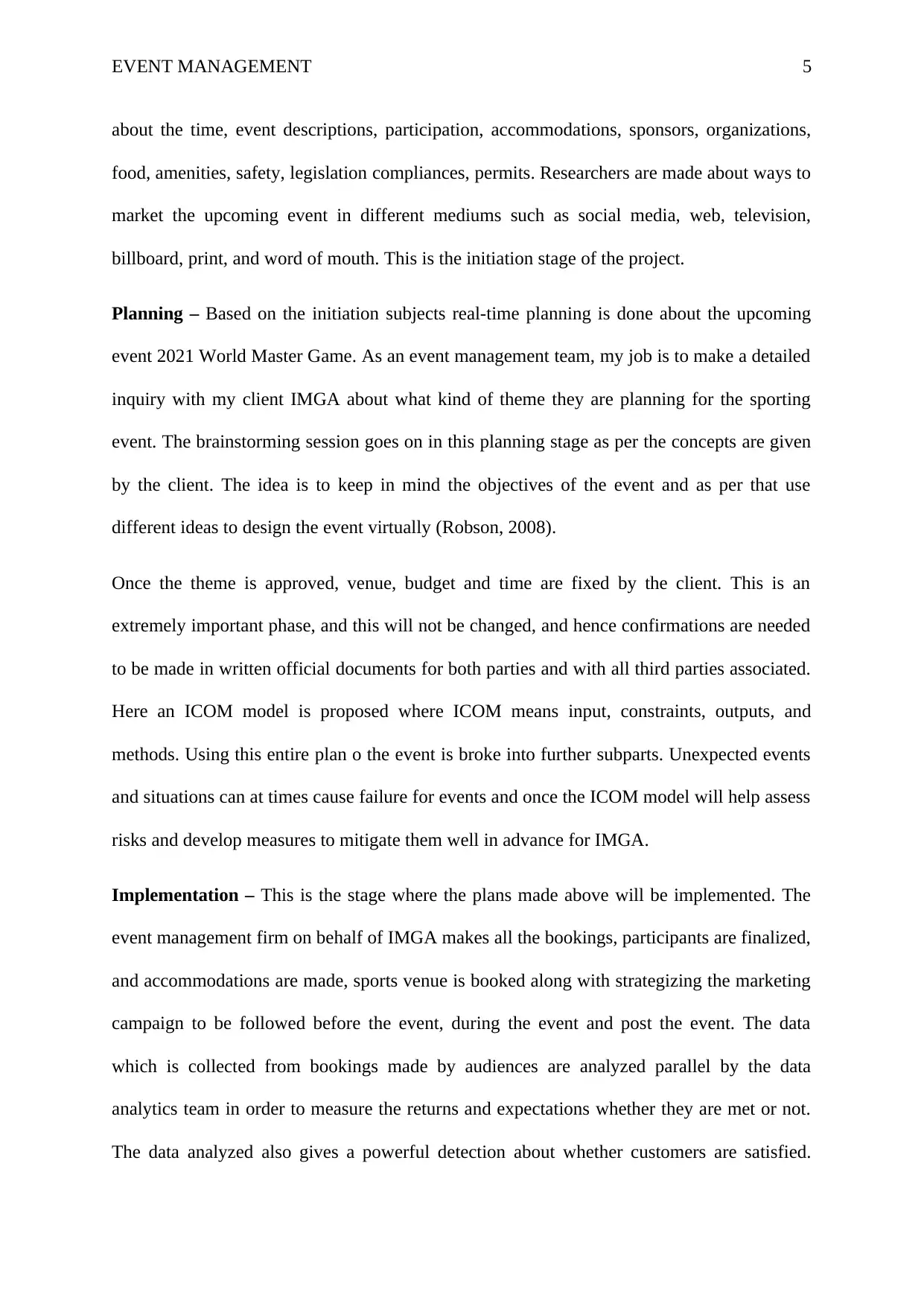
EVENT MANAGEMENT 5
about the time, event descriptions, participation, accommodations, sponsors, organizations,
food, amenities, safety, legislation compliances, permits. Researchers are made about ways to
market the upcoming event in different mediums such as social media, web, television,
billboard, print, and word of mouth. This is the initiation stage of the project.
Planning – Based on the initiation subjects real-time planning is done about the upcoming
event 2021 World Master Game. As an event management team, my job is to make a detailed
inquiry with my client IMGA about what kind of theme they are planning for the sporting
event. The brainstorming session goes on in this planning stage as per the concepts are given
by the client. The idea is to keep in mind the objectives of the event and as per that use
different ideas to design the event virtually (Robson, 2008).
Once the theme is approved, venue, budget and time are fixed by the client. This is an
extremely important phase, and this will not be changed, and hence confirmations are needed
to be made in written official documents for both parties and with all third parties associated.
Here an ICOM model is proposed where ICOM means input, constraints, outputs, and
methods. Using this entire plan o the event is broke into further subparts. Unexpected events
and situations can at times cause failure for events and once the ICOM model will help assess
risks and develop measures to mitigate them well in advance for IMGA.
Implementation – This is the stage where the plans made above will be implemented. The
event management firm on behalf of IMGA makes all the bookings, participants are finalized,
and accommodations are made, sports venue is booked along with strategizing the marketing
campaign to be followed before the event, during the event and post the event. The data
which is collected from bookings made by audiences are analyzed parallel by the data
analytics team in order to measure the returns and expectations whether they are met or not.
The data analyzed also gives a powerful detection about whether customers are satisfied.
about the time, event descriptions, participation, accommodations, sponsors, organizations,
food, amenities, safety, legislation compliances, permits. Researchers are made about ways to
market the upcoming event in different mediums such as social media, web, television,
billboard, print, and word of mouth. This is the initiation stage of the project.
Planning – Based on the initiation subjects real-time planning is done about the upcoming
event 2021 World Master Game. As an event management team, my job is to make a detailed
inquiry with my client IMGA about what kind of theme they are planning for the sporting
event. The brainstorming session goes on in this planning stage as per the concepts are given
by the client. The idea is to keep in mind the objectives of the event and as per that use
different ideas to design the event virtually (Robson, 2008).
Once the theme is approved, venue, budget and time are fixed by the client. This is an
extremely important phase, and this will not be changed, and hence confirmations are needed
to be made in written official documents for both parties and with all third parties associated.
Here an ICOM model is proposed where ICOM means input, constraints, outputs, and
methods. Using this entire plan o the event is broke into further subparts. Unexpected events
and situations can at times cause failure for events and once the ICOM model will help assess
risks and develop measures to mitigate them well in advance for IMGA.
Implementation – This is the stage where the plans made above will be implemented. The
event management firm on behalf of IMGA makes all the bookings, participants are finalized,
and accommodations are made, sports venue is booked along with strategizing the marketing
campaign to be followed before the event, during the event and post the event. The data
which is collected from bookings made by audiences are analyzed parallel by the data
analytics team in order to measure the returns and expectations whether they are met or not.
The data analyzed also gives a powerful detection about whether customers are satisfied.
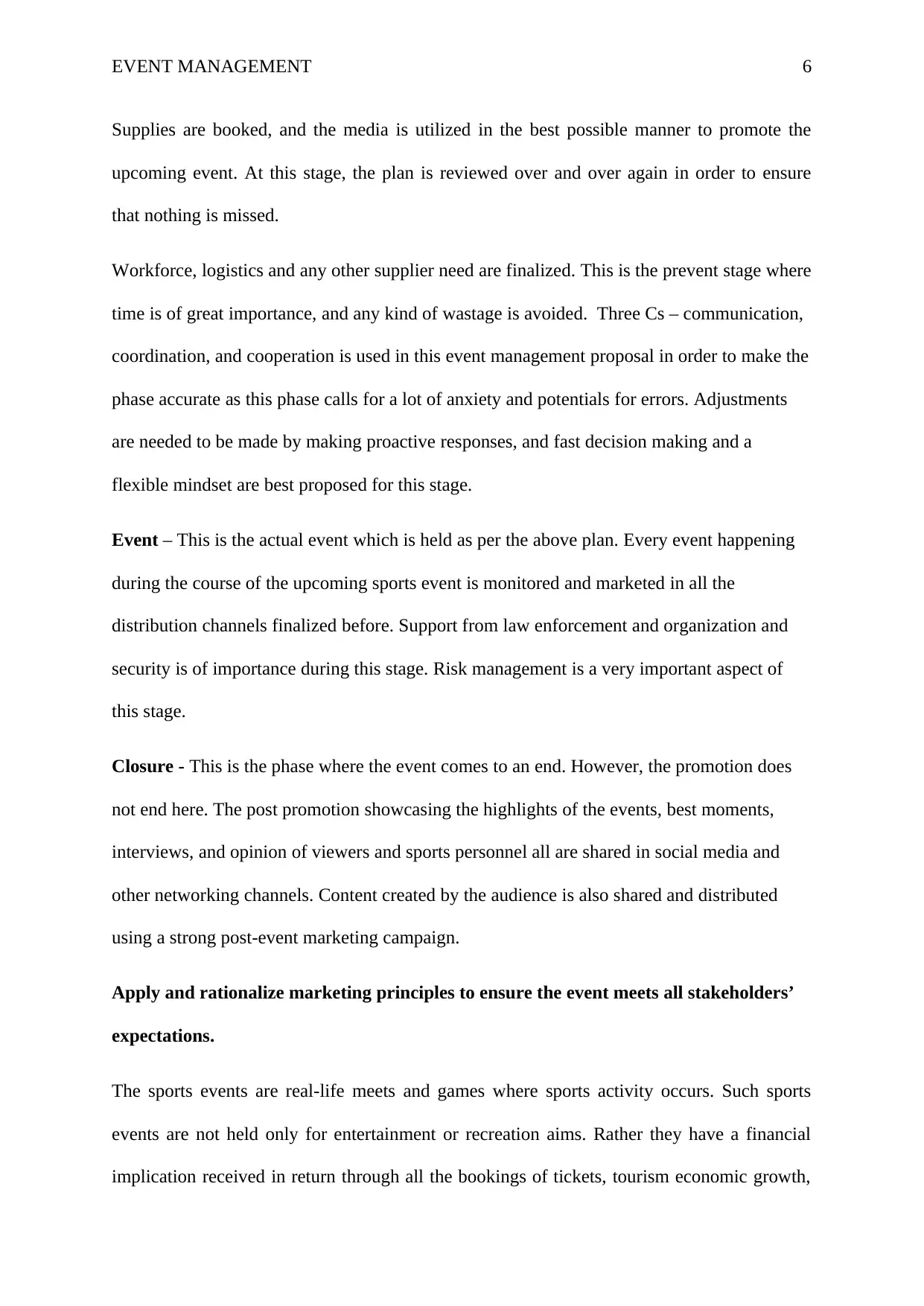
EVENT MANAGEMENT 6
Supplies are booked, and the media is utilized in the best possible manner to promote the
upcoming event. At this stage, the plan is reviewed over and over again in order to ensure
that nothing is missed.
Workforce, logistics and any other supplier need are finalized. This is the prevent stage where
time is of great importance, and any kind of wastage is avoided. Three Cs – communication,
coordination, and cooperation is used in this event management proposal in order to make the
phase accurate as this phase calls for a lot of anxiety and potentials for errors. Adjustments
are needed to be made by making proactive responses, and fast decision making and a
flexible mindset are best proposed for this stage.
Event – This is the actual event which is held as per the above plan. Every event happening
during the course of the upcoming sports event is monitored and marketed in all the
distribution channels finalized before. Support from law enforcement and organization and
security is of importance during this stage. Risk management is a very important aspect of
this stage.
Closure - This is the phase where the event comes to an end. However, the promotion does
not end here. The post promotion showcasing the highlights of the events, best moments,
interviews, and opinion of viewers and sports personnel all are shared in social media and
other networking channels. Content created by the audience is also shared and distributed
using a strong post-event marketing campaign.
Apply and rationalize marketing principles to ensure the event meets all stakeholders’
expectations.
The sports events are real-life meets and games where sports activity occurs. Such sports
events are not held only for entertainment or recreation aims. Rather they have a financial
implication received in return through all the bookings of tickets, tourism economic growth,
Supplies are booked, and the media is utilized in the best possible manner to promote the
upcoming event. At this stage, the plan is reviewed over and over again in order to ensure
that nothing is missed.
Workforce, logistics and any other supplier need are finalized. This is the prevent stage where
time is of great importance, and any kind of wastage is avoided. Three Cs – communication,
coordination, and cooperation is used in this event management proposal in order to make the
phase accurate as this phase calls for a lot of anxiety and potentials for errors. Adjustments
are needed to be made by making proactive responses, and fast decision making and a
flexible mindset are best proposed for this stage.
Event – This is the actual event which is held as per the above plan. Every event happening
during the course of the upcoming sports event is monitored and marketed in all the
distribution channels finalized before. Support from law enforcement and organization and
security is of importance during this stage. Risk management is a very important aspect of
this stage.
Closure - This is the phase where the event comes to an end. However, the promotion does
not end here. The post promotion showcasing the highlights of the events, best moments,
interviews, and opinion of viewers and sports personnel all are shared in social media and
other networking channels. Content created by the audience is also shared and distributed
using a strong post-event marketing campaign.
Apply and rationalize marketing principles to ensure the event meets all stakeholders’
expectations.
The sports events are real-life meets and games where sports activity occurs. Such sports
events are not held only for entertainment or recreation aims. Rather they have a financial
implication received in return through all the bookings of tickets, tourism economic growth,
⊘ This is a preview!⊘
Do you want full access?
Subscribe today to unlock all pages.

Trusted by 1+ million students worldwide
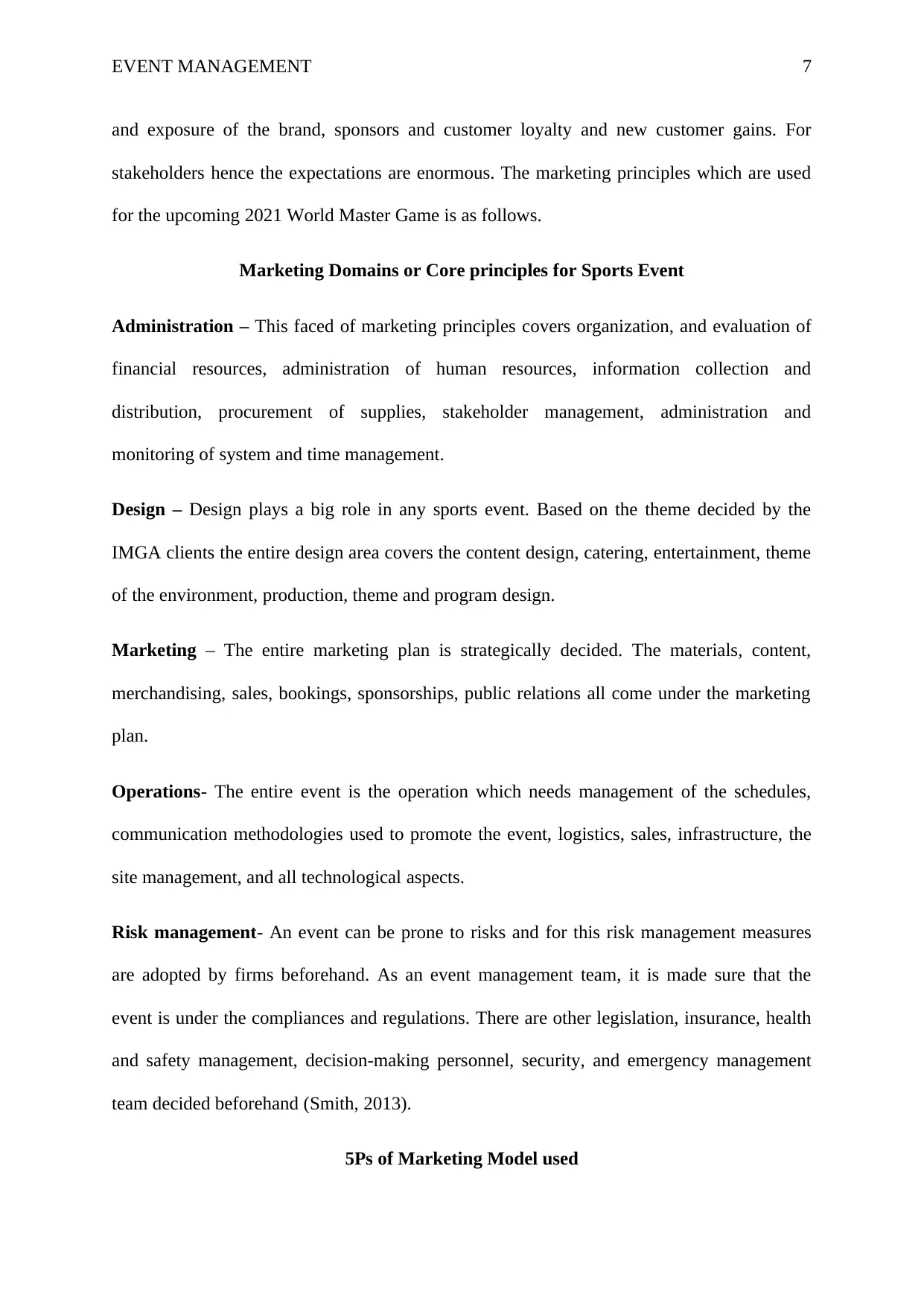
EVENT MANAGEMENT 7
and exposure of the brand, sponsors and customer loyalty and new customer gains. For
stakeholders hence the expectations are enormous. The marketing principles which are used
for the upcoming 2021 World Master Game is as follows.
Marketing Domains or Core principles for Sports Event
Administration – This faced of marketing principles covers organization, and evaluation of
financial resources, administration of human resources, information collection and
distribution, procurement of supplies, stakeholder management, administration and
monitoring of system and time management.
Design – Design plays a big role in any sports event. Based on the theme decided by the
IMGA clients the entire design area covers the content design, catering, entertainment, theme
of the environment, production, theme and program design.
Marketing – The entire marketing plan is strategically decided. The materials, content,
merchandising, sales, bookings, sponsorships, public relations all come under the marketing
plan.
Operations- The entire event is the operation which needs management of the schedules,
communication methodologies used to promote the event, logistics, sales, infrastructure, the
site management, and all technological aspects.
Risk management- An event can be prone to risks and for this risk management measures
are adopted by firms beforehand. As an event management team, it is made sure that the
event is under the compliances and regulations. There are other legislation, insurance, health
and safety management, decision-making personnel, security, and emergency management
team decided beforehand (Smith, 2013).
5Ps of Marketing Model used
and exposure of the brand, sponsors and customer loyalty and new customer gains. For
stakeholders hence the expectations are enormous. The marketing principles which are used
for the upcoming 2021 World Master Game is as follows.
Marketing Domains or Core principles for Sports Event
Administration – This faced of marketing principles covers organization, and evaluation of
financial resources, administration of human resources, information collection and
distribution, procurement of supplies, stakeholder management, administration and
monitoring of system and time management.
Design – Design plays a big role in any sports event. Based on the theme decided by the
IMGA clients the entire design area covers the content design, catering, entertainment, theme
of the environment, production, theme and program design.
Marketing – The entire marketing plan is strategically decided. The materials, content,
merchandising, sales, bookings, sponsorships, public relations all come under the marketing
plan.
Operations- The entire event is the operation which needs management of the schedules,
communication methodologies used to promote the event, logistics, sales, infrastructure, the
site management, and all technological aspects.
Risk management- An event can be prone to risks and for this risk management measures
are adopted by firms beforehand. As an event management team, it is made sure that the
event is under the compliances and regulations. There are other legislation, insurance, health
and safety management, decision-making personnel, security, and emergency management
team decided beforehand (Smith, 2013).
5Ps of Marketing Model used
Paraphrase This Document
Need a fresh take? Get an instant paraphrase of this document with our AI Paraphraser
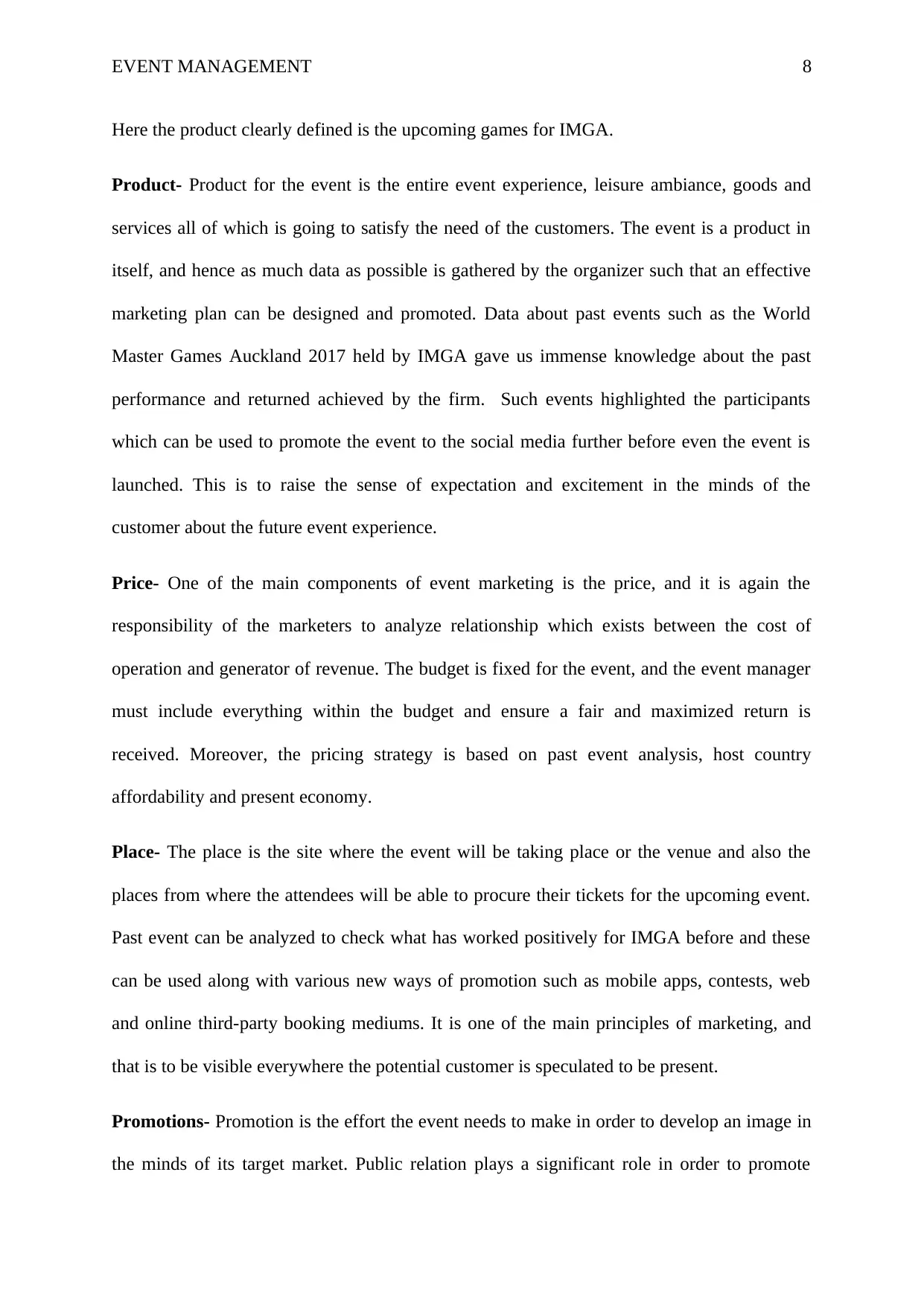
EVENT MANAGEMENT 8
Here the product clearly defined is the upcoming games for IMGA.
Product- Product for the event is the entire event experience, leisure ambiance, goods and
services all of which is going to satisfy the need of the customers. The event is a product in
itself, and hence as much data as possible is gathered by the organizer such that an effective
marketing plan can be designed and promoted. Data about past events such as the World
Master Games Auckland 2017 held by IMGA gave us immense knowledge about the past
performance and returned achieved by the firm. Such events highlighted the participants
which can be used to promote the event to the social media further before even the event is
launched. This is to raise the sense of expectation and excitement in the minds of the
customer about the future event experience.
Price- One of the main components of event marketing is the price, and it is again the
responsibility of the marketers to analyze relationship which exists between the cost of
operation and generator of revenue. The budget is fixed for the event, and the event manager
must include everything within the budget and ensure a fair and maximized return is
received. Moreover, the pricing strategy is based on past event analysis, host country
affordability and present economy.
Place- The place is the site where the event will be taking place or the venue and also the
places from where the attendees will be able to procure their tickets for the upcoming event.
Past event can be analyzed to check what has worked positively for IMGA before and these
can be used along with various new ways of promotion such as mobile apps, contests, web
and online third-party booking mediums. It is one of the main principles of marketing, and
that is to be visible everywhere the potential customer is speculated to be present.
Promotions- Promotion is the effort the event needs to make in order to develop an image in
the minds of its target market. Public relation plays a significant role in order to promote
Here the product clearly defined is the upcoming games for IMGA.
Product- Product for the event is the entire event experience, leisure ambiance, goods and
services all of which is going to satisfy the need of the customers. The event is a product in
itself, and hence as much data as possible is gathered by the organizer such that an effective
marketing plan can be designed and promoted. Data about past events such as the World
Master Games Auckland 2017 held by IMGA gave us immense knowledge about the past
performance and returned achieved by the firm. Such events highlighted the participants
which can be used to promote the event to the social media further before even the event is
launched. This is to raise the sense of expectation and excitement in the minds of the
customer about the future event experience.
Price- One of the main components of event marketing is the price, and it is again the
responsibility of the marketers to analyze relationship which exists between the cost of
operation and generator of revenue. The budget is fixed for the event, and the event manager
must include everything within the budget and ensure a fair and maximized return is
received. Moreover, the pricing strategy is based on past event analysis, host country
affordability and present economy.
Place- The place is the site where the event will be taking place or the venue and also the
places from where the attendees will be able to procure their tickets for the upcoming event.
Past event can be analyzed to check what has worked positively for IMGA before and these
can be used along with various new ways of promotion such as mobile apps, contests, web
and online third-party booking mediums. It is one of the main principles of marketing, and
that is to be visible everywhere the potential customer is speculated to be present.
Promotions- Promotion is the effort the event needs to make in order to develop an image in
the minds of its target market. Public relation plays a significant role in order to promote
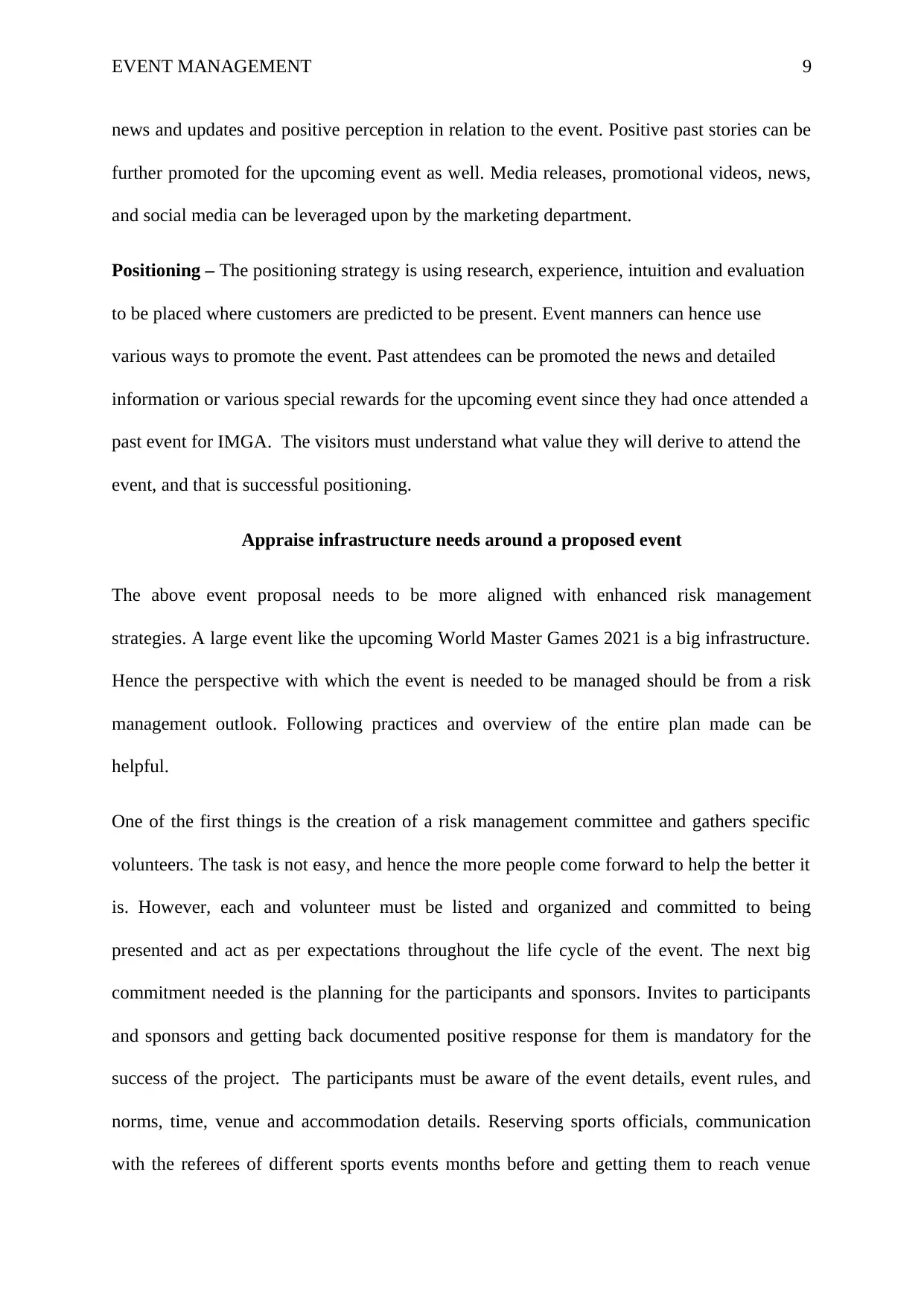
EVENT MANAGEMENT 9
news and updates and positive perception in relation to the event. Positive past stories can be
further promoted for the upcoming event as well. Media releases, promotional videos, news,
and social media can be leveraged upon by the marketing department.
Positioning – The positioning strategy is using research, experience, intuition and evaluation
to be placed where customers are predicted to be present. Event manners can hence use
various ways to promote the event. Past attendees can be promoted the news and detailed
information or various special rewards for the upcoming event since they had once attended a
past event for IMGA. The visitors must understand what value they will derive to attend the
event, and that is successful positioning.
Appraise infrastructure needs around a proposed event
The above event proposal needs to be more aligned with enhanced risk management
strategies. A large event like the upcoming World Master Games 2021 is a big infrastructure.
Hence the perspective with which the event is needed to be managed should be from a risk
management outlook. Following practices and overview of the entire plan made can be
helpful.
One of the first things is the creation of a risk management committee and gathers specific
volunteers. The task is not easy, and hence the more people come forward to help the better it
is. However, each and volunteer must be listed and organized and committed to being
presented and act as per expectations throughout the life cycle of the event. The next big
commitment needed is the planning for the participants and sponsors. Invites to participants
and sponsors and getting back documented positive response for them is mandatory for the
success of the project. The participants must be aware of the event details, event rules, and
norms, time, venue and accommodation details. Reserving sports officials, communication
with the referees of different sports events months before and getting them to reach venue
news and updates and positive perception in relation to the event. Positive past stories can be
further promoted for the upcoming event as well. Media releases, promotional videos, news,
and social media can be leveraged upon by the marketing department.
Positioning – The positioning strategy is using research, experience, intuition and evaluation
to be placed where customers are predicted to be present. Event manners can hence use
various ways to promote the event. Past attendees can be promoted the news and detailed
information or various special rewards for the upcoming event since they had once attended a
past event for IMGA. The visitors must understand what value they will derive to attend the
event, and that is successful positioning.
Appraise infrastructure needs around a proposed event
The above event proposal needs to be more aligned with enhanced risk management
strategies. A large event like the upcoming World Master Games 2021 is a big infrastructure.
Hence the perspective with which the event is needed to be managed should be from a risk
management outlook. Following practices and overview of the entire plan made can be
helpful.
One of the first things is the creation of a risk management committee and gathers specific
volunteers. The task is not easy, and hence the more people come forward to help the better it
is. However, each and volunteer must be listed and organized and committed to being
presented and act as per expectations throughout the life cycle of the event. The next big
commitment needed is the planning for the participants and sponsors. Invites to participants
and sponsors and getting back documented positive response for them is mandatory for the
success of the project. The participants must be aware of the event details, event rules, and
norms, time, venue and accommodation details. Reserving sports officials, communication
with the referees of different sports events months before and getting them to reach venue
⊘ This is a preview!⊘
Do you want full access?
Subscribe today to unlock all pages.

Trusted by 1+ million students worldwide
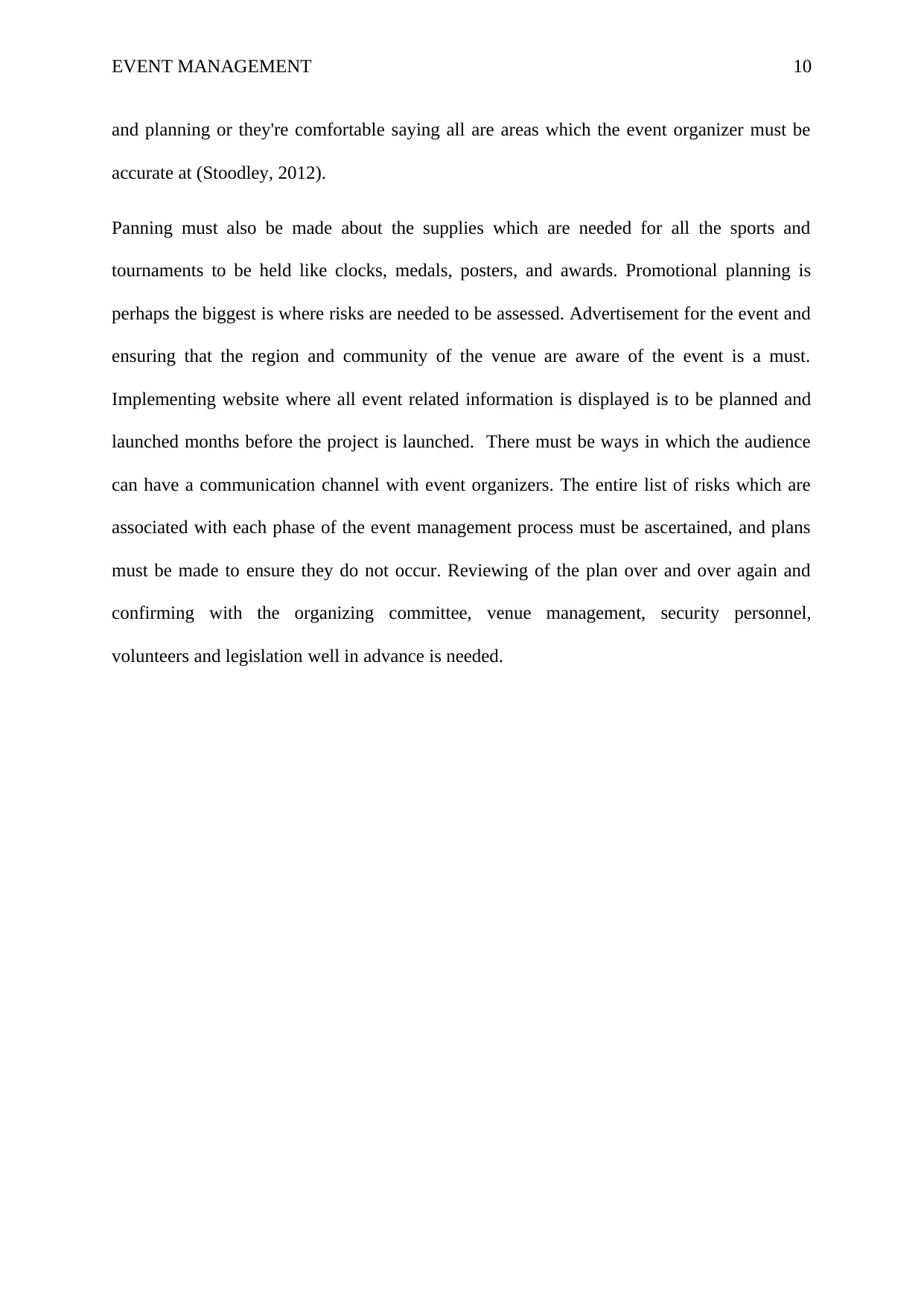
EVENT MANAGEMENT 10
and planning or they're comfortable saying all are areas which the event organizer must be
accurate at (Stoodley, 2012).
Panning must also be made about the supplies which are needed for all the sports and
tournaments to be held like clocks, medals, posters, and awards. Promotional planning is
perhaps the biggest is where risks are needed to be assessed. Advertisement for the event and
ensuring that the region and community of the venue are aware of the event is a must.
Implementing website where all event related information is displayed is to be planned and
launched months before the project is launched. There must be ways in which the audience
can have a communication channel with event organizers. The entire list of risks which are
associated with each phase of the event management process must be ascertained, and plans
must be made to ensure they do not occur. Reviewing of the plan over and over again and
confirming with the organizing committee, venue management, security personnel,
volunteers and legislation well in advance is needed.
and planning or they're comfortable saying all are areas which the event organizer must be
accurate at (Stoodley, 2012).
Panning must also be made about the supplies which are needed for all the sports and
tournaments to be held like clocks, medals, posters, and awards. Promotional planning is
perhaps the biggest is where risks are needed to be assessed. Advertisement for the event and
ensuring that the region and community of the venue are aware of the event is a must.
Implementing website where all event related information is displayed is to be planned and
launched months before the project is launched. There must be ways in which the audience
can have a communication channel with event organizers. The entire list of risks which are
associated with each phase of the event management process must be ascertained, and plans
must be made to ensure they do not occur. Reviewing of the plan over and over again and
confirming with the organizing committee, venue management, security personnel,
volunteers and legislation well in advance is needed.
Paraphrase This Document
Need a fresh take? Get an instant paraphrase of this document with our AI Paraphraser
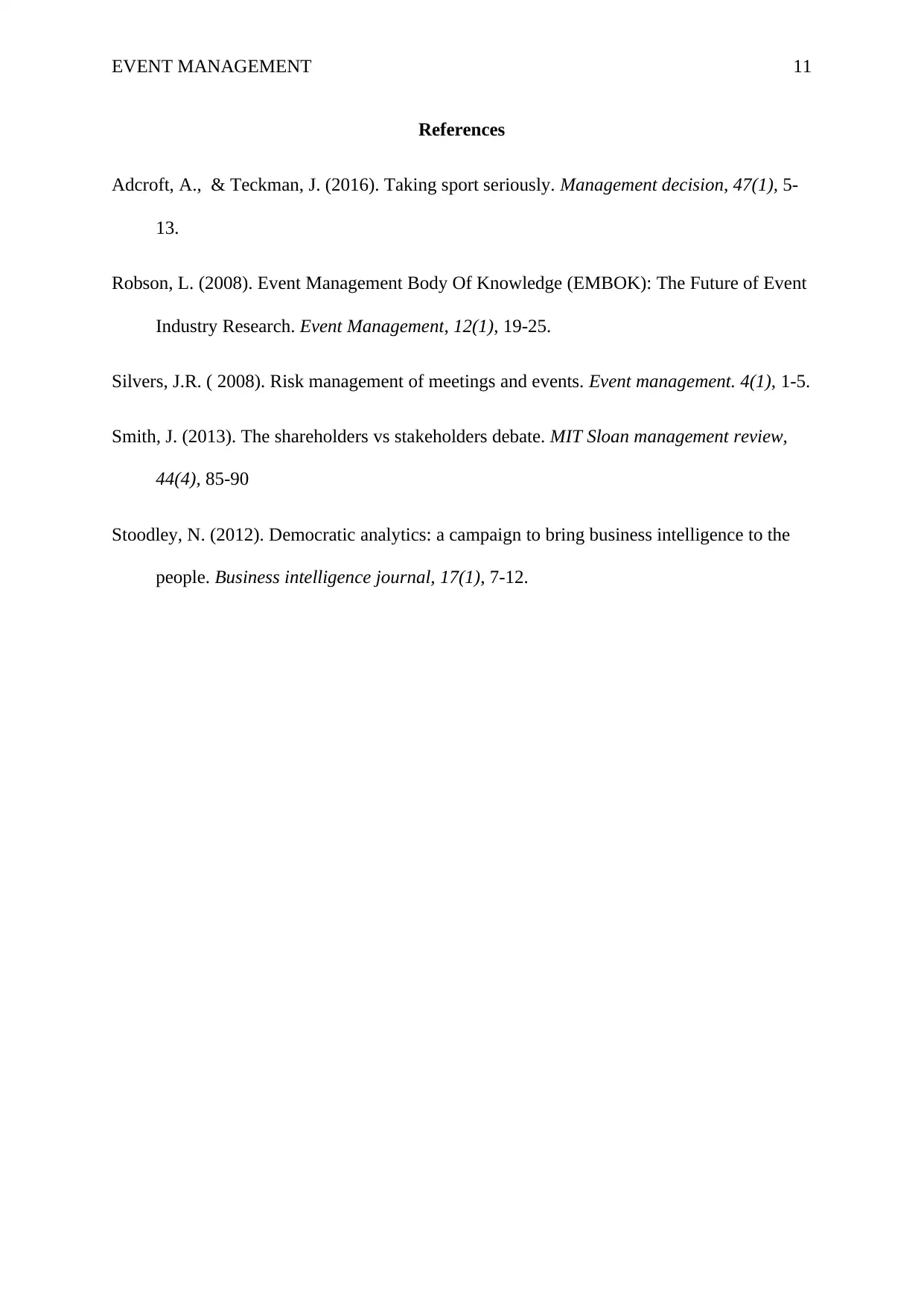
EVENT MANAGEMENT 11
References
Adcroft, A., & Teckman, J. (2016). Taking sport seriously. Management decision, 47(1), 5-
13.
Robson, L. (2008). Event Management Body Of Knowledge (EMBOK): The Future of Event
Industry Research. Event Management, 12(1), 19-25.
Silvers, J.R. ( 2008). Risk management of meetings and events. Event management. 4(1), 1-5.
Smith, J. (2013). The shareholders vs stakeholders debate. MIT Sloan management review,
44(4), 85-90
Stoodley, N. (2012). Democratic analytics: a campaign to bring business intelligence to the
people. Business intelligence journal, 17(1), 7-12.
References
Adcroft, A., & Teckman, J. (2016). Taking sport seriously. Management decision, 47(1), 5-
13.
Robson, L. (2008). Event Management Body Of Knowledge (EMBOK): The Future of Event
Industry Research. Event Management, 12(1), 19-25.
Silvers, J.R. ( 2008). Risk management of meetings and events. Event management. 4(1), 1-5.
Smith, J. (2013). The shareholders vs stakeholders debate. MIT Sloan management review,
44(4), 85-90
Stoodley, N. (2012). Democratic analytics: a campaign to bring business intelligence to the
people. Business intelligence journal, 17(1), 7-12.
1 out of 11
Related Documents
Your All-in-One AI-Powered Toolkit for Academic Success.
+13062052269
info@desklib.com
Available 24*7 on WhatsApp / Email
![[object Object]](/_next/static/media/star-bottom.7253800d.svg)
Unlock your academic potential
Copyright © 2020–2026 A2Z Services. All Rights Reserved. Developed and managed by ZUCOL.





